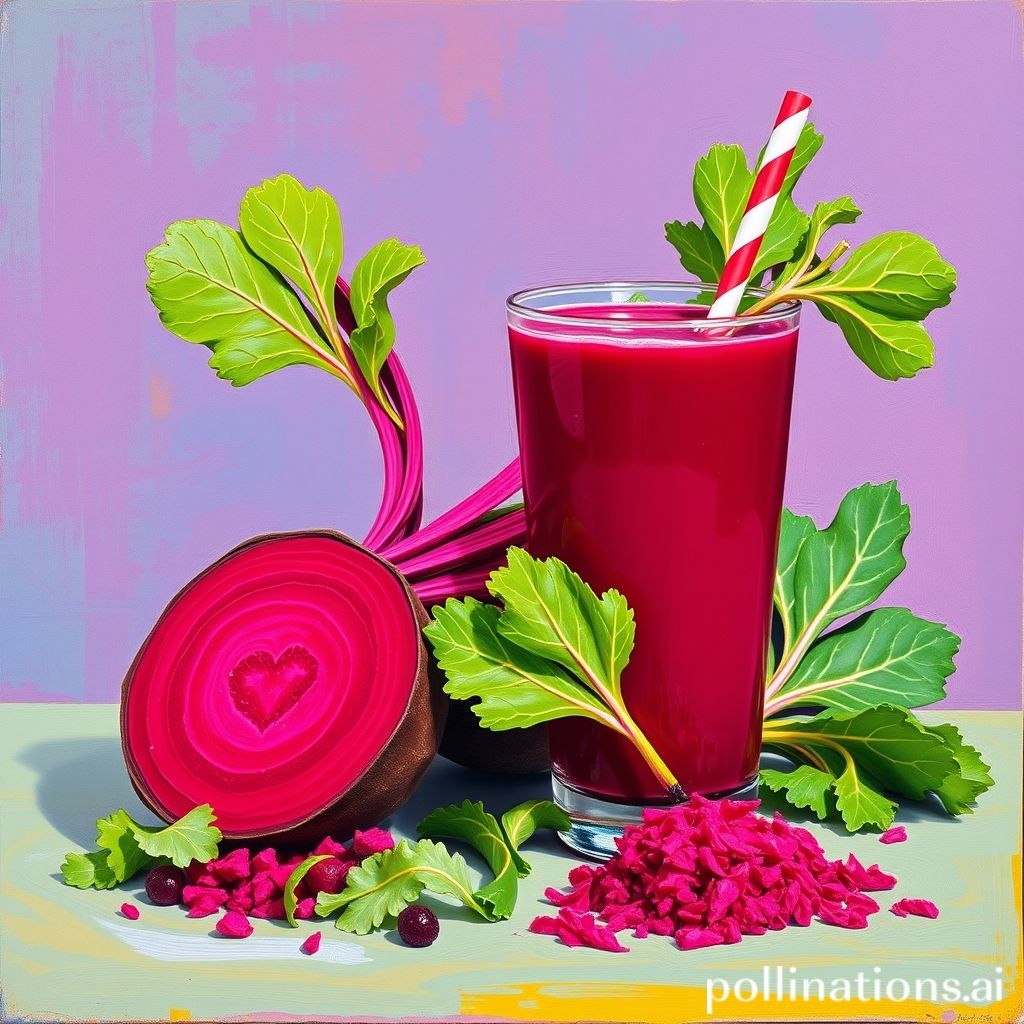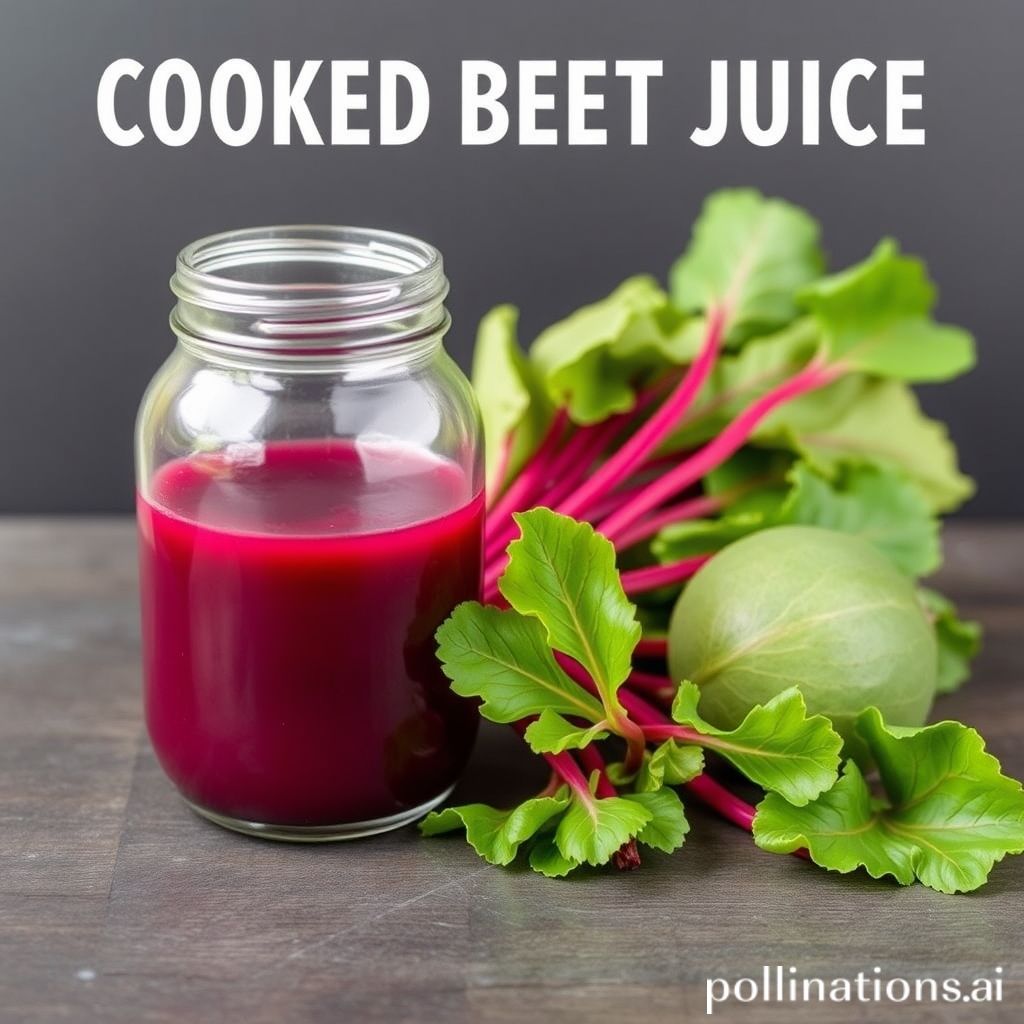Is Beet Juice Better Raw Or Cooked?
A 2021 review in Nutrition Journal offers insights into the question of whether beet juice is better raw or cooked. According to the study, the effectiveness of beet juice in reducing blood pressure depends on several factors.
The researchers found that beet juice, being more concentrated, tends to be more effective in lowering blood pressure compared to eating beetroot. They also noted that individuals with untreated hypertension tend to experience greater benefits from consuming beet juice. In essence, if you are currently on medication for high blood pressure, the impact of consuming beets, whether raw or cooked, may be less pronounced. This information aims to address the curiosity surrounding the optimal way to consume beet juice and its potential health effects.

Table of Contents
Nutritional Value of Beet Juice
1. Vitamins, Minerals, and Antioxidants
Beet juice is rich in essential vitamins, minerals, and antioxidants, which are beneficial for overall health and well-being. It contains a high amount of vitamin C, which boosts the immune system and promotes the production of collagen for healthy skin. Additionally, beet juice is a good source of folate, a B-vitamin that is necessary for cell growth and development. It also provides important nutrients like potassium, manganese, and iron.
Furthermore, beet juice is packed with antioxidants such as betalains and flavonoids. These compounds have anti-inflammatory properties, protect against oxidative stress, and support cardiovascular health. Betalains, in particular, have been studied for their potential anti-cancer effects.
2. Health Benefits of Consuming Beet Juice
Regular consumption of beet juice offers various health benefits. The high nitrate content in beet juice improves athletic performance and endurance by increasing oxygen delivery to muscles, making it ideal for athletes and those involved in intense physical activities.
In addition, beet juice may help lower blood pressure due to its nitrate content, which promotes vasodilation and improves blood flow. Studies have shown that daily consumption of beet juice can significantly reduce systolic and diastolic blood pressure.
Moreover, the antioxidants present in beet juice contribute to the prevention of chronic diseases, including heart disease, by reducing inflammation and oxidative stress. The betalains in beet juice have also been linked to potential anti-inflammatory and anti-cancer effects.
Furthermore, incorporating beet juice into one’s diet can support liver health as it contains compounds that aid in liver detoxification and promote optimal functioning.
Expert Tips: Boost your health with beet juice! Packed with vitamins, antioxidants, and minerals, it supports immune function, improves athletic performance, lowers blood pressure, and promotes liver health.Raw Beet Juice: Benefits and Effects
1. Investigating the advantages of consuming raw beet juice
Consuming raw beet juice offers several advantages compared to cooked beet juice. When beet juice is not heated, it retains a higher concentration of essential nutrients, making it a potent source of health-boosting compounds.
2. Discussing the potential impact of raw beet juice on nutrient retention and absorption
Raw beet juice preserves the natural goodness of nutrients, ensuring optimal absorption by the body. By avoiding the cooking process, the integrity of nutrients such as vitamins, minerals, and antioxidants remains intact, enhancing their bioavailability.
3. Nutrients in Raw Beet Juice
Raw beet juice contains various essential nutrients that contribute to overall well-being. These nutrients provide a range of health benefits and support various bodily functions. Some key nutrients found in raw beet juice include:
| Nutrient | Benefits |
|---|---|
| 1. Retention of Nutrients in Raw Beet Juice | Retaining the nutrients in raw beet juice ensures maximum nutritional value, promoting better overall health. |
| 2. Enhanced Bioavailability of Nutrients in Raw Beet Juice | The bioavailability of nutrients in raw beet juice is increased, allowing for better absorption and utilization by the body. |
By consuming raw beet juice, individuals can enjoy the benefits of these nutrients and experience improved vitality and well-being. Incorporating this vibrant juice into a balanced diet can be a simple and effective way to enhance overall health and optimize nutrient intake.
Cooked Beet Juice: Benefits and Effects
1. The Benefits of Consuming Cooked Beet Juice
Consuming cooked beet juice can offer several benefits that can improve your overall health and well-being.
- Enhanced flavor: Cooking beet juice enhances its flavor, making it more enjoyable to drink.
- Improved digestibility: Cooking breaks down the tough fibers in raw beet juice, making it easier to digest and absorb.
- Increased antioxidant activity: Cooking beet juice increases the availability of antioxidants like betalains, which have various health benefits.
2. The Impact of Cooking on Nutrient Content and Bioavailability
Cooking beet juice can affect its nutrient content and bioavailability, potentially altering its overall nutritional value.
2.1 Nutrient Content in Cooked Beet Juice
Cooking beet juice can cause changes in its nutrient content, specifically:
- Loss of water-soluble vitamins: Some water-soluble vitamins, such as vitamin C and B vitamins, may be partially lost during the cooking process.
- Retention of minerals: Minerals like iron and potassium are generally well-preserved in cooked beet juice.
2.2 Modified Bioavailability of Nutrients in Cooked Beet Juice
The bioavailability of nutrients in cooked beet juice may differ from that of raw beet juice. Factors such as heat and cooking methods can affect the absorption and utilization of nutrients.
A study published in the Journal of Agricultural and Food Chemistry found that cooking beet juice increased the bioavailability of certain antioxidants, potentially enhancing their health benefits.
Conversely, it’s important to note that prolonged cooking or high heat can lead to nutrient losses. To retain the maximum nutritional value, it is recommended to use gentle cooking methods such as steaming or roasting.

Is Beet Juice Better Raw Or Cooked?
Comparing Raw and Cooked Beet Juice
As for beet juice, many people wonder whether it is better to consume it raw or cooked. The choice between raw and cooked beet juice can significantly impact its nutrient content and bioavailability. In this article, we will analyze the differences and discuss the potential effects of cooking methods on the nutritional value of beet juice.
1. Nutrient Content Comparison
Raw beet juice contains a variety of essential nutrients, including vitamins, minerals, and antioxidants. Albeit, cooking can cause some nutrient loss. Heat exposure may degrade heat-sensitive vitamins, such as vitamin C and folate. In contradistinction, cooking can enhance the availability of certain nutrients, such as betaine.
By comparing the nutrient content of raw and cooked beet juice, we can gain insights into the impact of different preparation methods on the overall nutritional profile.
2. Bioavailability Comparison
The bioavailability of nutrients refers to how well they can be absorbed and utilized by the body. Cooking beet juice can affect the bioavailability of certain nutrients. Some compounds in raw beets, like oxalic acid, can hinder the absorption of minerals like calcium and iron. Cooking can help reduce the levels of these compounds, thereby increasing the bioavailability of essential minerals.
By discussing the bioavailability comparison between raw and cooked beet juice, we can understand how different preparation methods can influence the body’s ability to absorb and benefit from the nutrients present in beet juice.
Comparison
| Factors | Raw Beet Juice | Cooked Beet Juice |
|---|---|---|
| Nutrient Content | Contains a variety of nutrients, but some heat-sensitive vitamins may be lost | May experience nutrient loss, but cooking can enhance the availability of certain nutrients |
| Bioavailability | Some compounds in raw beets can hinder mineral absorption | Cooking can reduce levels of inhibitory compounds and increase mineral bioavailability |
By comparing the nutrient content and bioavailability of raw and cooked beet juice, individuals can make informed choices based on their specific nutritional needs and preferences.
– Consider consuming a mix of raw and cooked beet juice to maximize the nutrient content and bioavailability.
– Experiment with different cooking methods, such as steaming or roasting, to find the one that best suits your taste and nutritional goals.
Factors to Consider When Choosing Between Raw and Cooked Beet Juice
1. Personal Preferences and Taste
When deciding whether to consume beet juice raw or cooked, personal preference and taste play a significant role. Some people enjoy the earthy and slightly bitter taste of raw beet juice, In the course of others may find it too strong. Cooking beet juice can help reduce the intensity of the flavor, making it more enjoyable for those who are not fond of the raw taste. Consider your own taste preferences and choose the preparation method that you find most pleasing.
2. Health Conditions and Dietary Restrictions
Another important factor to consider is any existing health conditions or dietary restrictions you may have. Raw beet juice is packed with nutrients and enzymes that can benefit overall health. Conversely, individuals with specific health conditions, such as kidney stones or gastrointestinal issues, may find that consuming raw beet juice worsens their symptoms. In such cases, cooking beet juice can help lower the levels of certain compounds that may be problematic. It is crucial to consult with a healthcare professional or registered dietitian if you have any underlying health conditions or dietary restrictions to determine the best preparation method for your specific needs.
Conclusion
Whether beet juice is better raw or cooked depends on individual preferences and health goals. Raw beet juice may offer higher levels of certain nutrients, enzymes, and antioxidants that can support overall health.
In contrast, cooking beet juice can enhance its sweetness and reduce the earthy taste. Both raw and cooked beet juice can be beneficial additions to a balanced diet. It is recommended to experiment with different preparation methods and choose the one that suits your taste buds and nutritional needs. Remember to consult a healthcare professional for personalized advice.
FAQ: Is Beet Juice Better Raw or Cooked?
FAQ 1: Can I drink raw beet juice every day?
Yes, you can drink raw beet juice every day. Raw beet juice is rich in vitamins, minerals, and antioxidants that can provide numerous health benefits. Conversely, it is important to note that consuming large amounts of beet juice may cause temporary changes in urine color or gastrointestinal discomfort in some individuals. It is advisable to start with smaller quantities and gradually increase the intake to assess your tolerance.
FAQ 2: Does cooking beet juice destroy its nutritional value?
Cooking beet juice can slightly reduce its nutritional value. Heat exposure during cooking may cause some loss of vitamins and antioxidants. Conversely, beets still retain a significant amount of their nutrients even after cooking. If you prefer cooked beet juice, steaming or roasting the beets is a better option as it helps retain more nutrients compared to boiling.
FAQ 3: Is it better to juice beets or eat them whole?
Both juicing beets and eating them whole have their own benefits. Juicing beets allows for easier digestion and absorption of nutrients, During consuming whole beets provides additional dietary fiber. Juicing may be preferred for a quick nutrient boost, During eating beets whole can contribute to a well-rounded diet. Choose the method that suits your preferences and dietary needs.
FAQ 4: Can I mix raw and cooked beet juice together?
Yes, you can mix raw and cooked beet juice together. Combining raw and cooked beet juice allows you to enjoy the benefits of both forms. It can provide a balanced flavor profile and a variety of nutrients. Feel free to experiment and find the taste that suits your palate.
FAQ 5: Can I freeze beet juice for later consumption?
Yes, you can freeze beet juice for later consumption. Freezing beet juice can help preserve its nutritional value and extend its shelf life. Ensure that you store the juice in airtight containers or freezer-safe bags to prevent freezer burn and maintain its quality. Thaw the frozen beet juice in the refrigerator before consuming.
Read Similar Post:
1. Transform Your Health in One Week: The Power of Eating Beetroot
2. Boost Your Health: Optimal Frequency for Drinking Beetroot Juice

